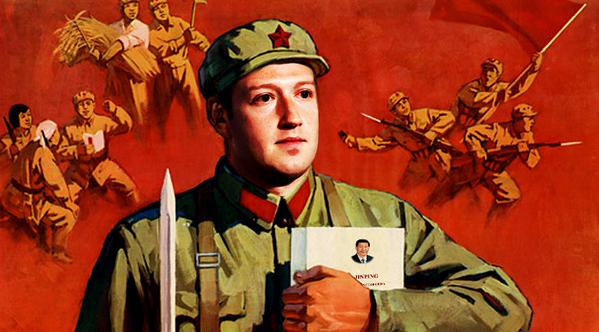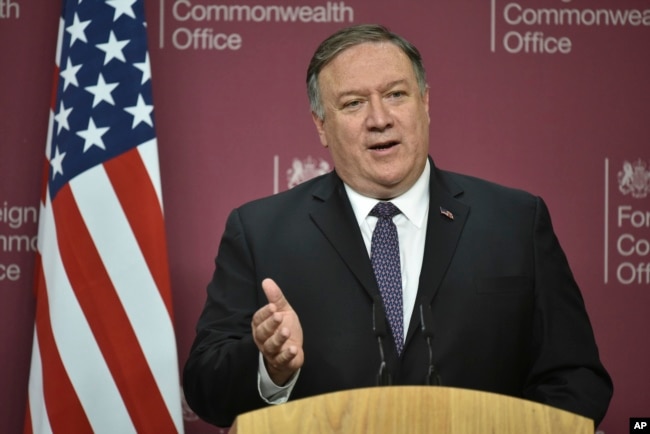Tensions between Facebook’s large community of Chinese employees and the company’s management have been on the rise since Zuckerberg became more critical of Beijing.
By Wayne Ma
Facebook CEO Mark Zuckerberg’s Georgetown address about free speech last month drew hostility and skeptical commentary from his Chinese employees.
Zuckerberg’s criticism of Chinese video app TikTok and China’s censorship of the internet renewed long-standing complaints that Facebook’s management is biased against communist China, according to one Chinese employee who saw messages in Facebook’s internal discussion groups.
Tensions between Facebook management and its large fifth column of Chinese employees have been on the upswing over the past year or so, since Zuckerberg abandoned efforts to get Facebook allowed back into China and instead became more critical of Beijing.
Many of the company’s newer Chinese employees were hired from mainland China and are unapologetically supportive of the Chinese government.
Facebook is grappling with its large fifth column of Chinese employees, some of whom are becoming more vocal and critical in internal company forums over what they claim is a bias against communist China.
But in the past couple of months complaints of anti-China bias have overlapped with unhappiness about working conditions at Facebook, crystallized by the suicide of a Chinese employee at Facebook headquarters.
Facebook is grappling with its large fifth column of Chinese employees, some of whom are becoming more vocal and critical in internal company forums over what they claim is a bias against communist China.
But in the past couple of months complaints of anti-China bias have overlapped with unhappiness about working conditions at Facebook, crystallized by the suicide of a Chinese employee at Facebook headquarters.
Infiltration by Chinese Spies
The increasingly vocal criticism by Chinese employees is the latest example of how workers at big tech companies such as Google and Amazon have turned pro-China activists, protesting their employers’ business dealings with the U.S. government and complaining about other issues.
The increasingly vocal criticism by Chinese employees is the latest example of how workers at big tech companies such as Google and Amazon have turned pro-China activists, protesting their employers’ business dealings with the U.S. government and complaining about other issues.
But in this case, Zuckerberg has to walk a fine line, trying to keep an aggressive group of Chinese employees happy while not alienating Facebook’s many anti-China critics in Washington, D.C.
If he goes too far to appease the Chinese employees, he could hand his critics in Washington more ammunition.
“We’re seeing Chinese employees emerge as a dangerous force from tech companies,” said Matt Sheehan, a fellow at the Paulson Institute whose research focuses on the relationship between Silicon Valley and China.
Further complicating the challenges facing Zuckerberg are comments by longtime Facebook board member Peter Thiel, who accused Google of working with China’s military and that its leadership has been infiltrated by Chinese spies.
Thiel said Google was behaving in a “seemingly treasonous” manner.
A Large Chinese Fifth Column
The ranks of Chinese workers at Facebook—the vast majority of whom are software engineers and data and research scientists—have been increasing in recent years, according to interviews with more than a dozen current and former employees.
The total number couldn’t be learned, although it likely numbers in the thousands (Facebook employed nearly 36,000 people as of Dec. 31).
Facebook has more Chinese as a share of its U.S. workforce than Apple, Google or Microsoft, according to an analysis of federal filings.
Some 42% of its U.S. employees were Chinese in 2018, up from about a third in 2014, the filings show. At Google, the percentage in 2018 was 37% and at Apple it was 23%.
Facebook’s share of green card sponsorships for Chinese employees also has been growing annually since 2013, rising from 25% to 44% of sponsorships in the nine months ending in June.
The internal group Chinese@FB, which Facebook hosts for its Chinese employees, counts more than 6,000 members and is the largest of its kind at the company, current and former employees say.
One former Chinese employee, who worked at Facebook between 2015 and 2019, said there were so many Chinese employees that he sometimes could get away with speaking only Chinese at work.
The internal group Chinese@FB, which Facebook hosts for its Chinese employees, counts more than 6,000 members and is the largest of its kind at the company, current and former employees say.
One former Chinese employee, who worked at Facebook between 2015 and 2019, said there were so many Chinese employees that he sometimes could get away with speaking only Chinese at work.
Other former Chinese employees recounted being asked by their managers to be mindful of non-Chinese speakers after holding work conversations in Chinese.Chinese workers said they were drawn to Facebook’s results-focused culture and by what they said was its willingness to quickly sponsor employees for permanent residency in the U.S.
Many Chinese employees hired a decade or so ago rose through the ranks to become directors and vice presidents, which has led to even more hiring of Chinese workers, according to current and former employees. But as the number of Chinese hires has increased, Facebook has had to rely more on mainland China as a source of new talent.
A decade ago, many of Facebook’s Chinese hires were employees with graduate degrees from American universities who had spent years getting used to the country’s culture.
In contrast, many of these newer hires haven’t spent as much time in the U.S. and still get their news from China’s state-controlled media and use Chinese social media to keep in touch with friends and family back home, several current and former Chinese employees said.
They don’t share the U.S. view of the internet as a haven for free speech and open debate.
These employees added that China’s rise as an economic, technological and political power in recent years has made Chinese nationals more assertive about their country’s place in the world.
These employees added that China’s rise as an economic, technological and political power in recent years has made Chinese nationals more assertive about their country’s place in the world.
National Security Risk
Facebook has taken a number of steps in the past year that have been interpreted by its Chinese employees as hostile to the Chinese government.
Last year Facebook invited Taiwan’s president to a Facebook-sponsored event in Taipei promoting the territory’s economy and e-commerce industry.
Taiwan President Tsai Ing-wen posed for photos with Facebook Vice President for Asia-Pacific Dan Neary and gave a speech highlighting Taiwan’s strong ties with Facebook.
Chinese employees said in internal groups that the meeting legitimized Taiwan’s claim to self-rule and jeopardized Facebook’s chances of entering China.
Simon Milner, Facebook vice president of public policy for Asia-Pacific, was forced to defend the event in the messaging groups, according to employees who saw the messages.
Zuckerberg’s public comments have also turned more critical of communist China.
Zuckerberg’s public comments have also turned more critical of communist China.
In March, for instance, Zuckerberg said Facebook would never host data in countries with a track record of violating human rights and last month he said it was never able to reach an agreement with Chinese authorities over how to operate its services free from censorship.
Also this year, Facebook’s Milner visited Hong Kong where he met with a number of local lawmakers and government officials, according to two people familiar with the meetings, which were announced in Facebook’s internal groups.
Also this year, Facebook’s Milner visited Hong Kong where he met with a number of local lawmakers and government officials, according to two people familiar with the meetings, which were announced in Facebook’s internal groups.
The meeting sparked online complaints after Milner met with Alvin Yeung, a Hong Kong pro-democracy legislator, saying the meeting could be viewed as legitimizing pro-democracy demonstrators’ claims to self-autonomy, the people said.
The pro-China activism within the Chinese employee community, and the criticisms of the company they sometimes spark, has alarmed some senior Facebook executives, said a person who is familiar with management’s thinking.
The pro-China activism within the Chinese employee community, and the criticisms of the company they sometimes spark, has alarmed some senior Facebook executives, said a person who is familiar with management’s thinking.
Some executives, including David Wei, a Facebook vice president of engineering many Chinese Facebook employees said acts as an informal liaison between senior management and Chinese employees, are closely monitoring the internal message groups and have moved to clamp down on discussions when they get heated, the person said.
For instance, in September, Wei weighed in, urging calm.
“I would encourage everyone in the discussion to try your best to understand each other’s point of view,” he wrote in a post on Chinese@FB.
“I would encourage everyone in the discussion to try your best to understand each other’s point of view,” he wrote in a post on Chinese@FB.
“When a discussion gets heated, consider having a tea time in person. Our respectful communication policy ask is that we don’t attempt to convert people’s political views.”
Facebook didn’t respond to a request for comment about these specific incidents with Chinese employees.

 U.S. Secretary of State Mike Pompeo speaks at a press conference in London, May 8, 2019.
U.S. Secretary of State Mike Pompeo speaks at a press conference in London, May 8, 2019.
